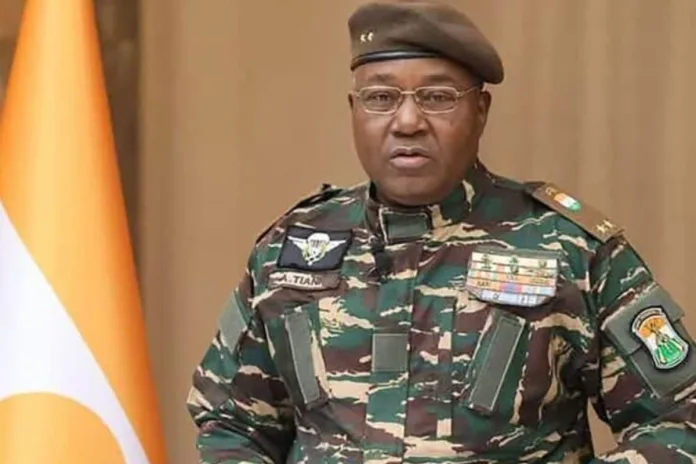In his latest televised address, General Abdourahamane Tiani, leader of Niger’s military junta, laid out what he claims are “non-political” reasons for keeping the border with Benin firmly shut. He framed the closure as a matter of national security, citing alleged French military operations being supported from Beninese soil.
But in truth, what Tiani delivered was not a security briefing — it was a masterclass in diversion. A strategic sleight of hand that shifts attention from Niger’s worsening internal crisis to the supposed sins of its neighbours.
Colonial ghosts and present failures
For over a year now, Tiani has painted France as the invisible hand behind every misfortune. Every attack, every uprising, every diplomatic strain is somehow linked to Paris. Now, Benin is cast as France’s willing accomplice — a “security threat” simply for maintaining bilateral defense ties, like many sovereign nations do.
But this logic raises an obvious question : Since when does Benin — or any African country — need Niger’s approval to define its foreign policy ?
Benin’s military cooperation with France predates Tiani’s coup. It is not clandestine, not illegal, and certainly not directed against Niger. The idea that Cotonou should suspend its partnerships to appease a military junta next door is not only diplomatically untenable — it is an affront to regional sovereignty.
A “Security Expert” blind to his own casualties
Even more troubling is Tiani’s paradoxical boast: in the same interview, he revealed that he has infiltrated major jihadist groups like the Islamic State in the Greater Sahara (ISGS), receiving firsthand intelligence from insiders. One would assume such access would be a game-changer in counterterrorism.
But the facts on the ground tell a very different story.
In just one month, May 2025, Niger suffered a devastating wave of attacks :
• May 3 – Tahoua: 16 soldiers killed, 6 injured.
• May 4 – Dosso : At least 8 soldiers killed, 16 missing.
• May 12 – Fantio (Tillabéri) : 5 villagers killed during Eid celebrations.
• May 24 – Eknewen (Tahoua) : 58 soldiers killed in an ISGS ambush.
• May 26 – Boumba-Falmey: 53 soldiers killed by JNIM (al-Qaeda-affiliated group).
That’s over 140 security forces lost in less than four weeks — many in areas less than 50 kilometers from the capital, Niamey. And yet, in Tiani’s rhetoric, not a single word of accountability. No recognition of operational failures. No mention of civilian displacement or trauma.
Instead, he accuses the Red Cross of aiding terrorists — a baseless and dangerous claim that undermines the few remaining humanitarian bridges in a crumbling Sahel.
An echo chamber of power
Tiani’s interviews follow a strict pattern. The questions are safe. The tone is deferential. His interviewer often acts more as a memory prompt than a journalist. This is no marketplace of ideas — it’s a monologue disguised as dialogue.
Meanwhile, the people of Niger are voiceless. Civil liberties have been silenced. The press is muzzled. Social media is under surveillance. The only narrative allowed is that of the regime: blame the West, punish the neighbours, and pretend that chaos is order .
But the Nigerien people know better. Under Mohamed Bazoum’s elected government, Niger was the least affected Sahelian country by terrorism. That reality is now conveniently forgotten — erased from the script of a junta too proud to admit that their so-called “liberation” has made life infinitely worse.
The bigger picture : Sovereignty vs. Subjugation
Let us be clear: Niger is free to choose its alliances. So is Benin. So is every nation in the Economic Community of West African States (ECOWAS). But sovereignty is not a one-way street . Tiani cannot demand strategic obedience from his neighbours while claiming non-interference for himself.
What he calls “security concerns” are in fact political ultimatums. What he frames as patriotic vigilance is, more accurately, regional bullying.
At a time when the Sahel is fractured, with military regimes in Mali, Burkina Faso and Niger embracing an isolationist “AES” bloc, the last thing the region needs is further division. Regional security depends on cross-border coordination — not closing gates and pointing fingers .
Leadership requires more than rhetoric
General Tiani wants to be seen as a soldier-statesman. But leadership is not measured by how loudly one blames foreign plots. It is measured by how one protects their people. And on that score, his record is damning .
He claims to know how to prevent terrorism in Benin, yet fails to stop it in Boni or Tillia — just a few dozen kilometers from his command center. He accuses others of neocolonialism while his own administration deepens dependency on new foreign patrons. He speaks of sovereignty, but governs by propaganda.
There is an African proverb that says: “When there is no enemy within, the enemies outside cannot hurt you”. Niger’s real danger today is not Benin, nor France — it is a regime that has turned inward and lost sight of its people’s suffering .
The Sahel does not need more polemics. It needs peace, integrity, and real cooperation. That starts with leaders who look inward — not outward — when seeking answers.
Suivez-nous sur Nasuba Infos via notre canal WhatsApp. Cliquez ici.

